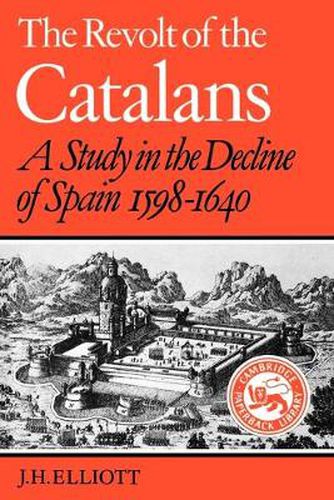Readings Newsletter
Become a Readings Member to make your shopping experience even easier.
Sign in or sign up for free!
You’re not far away from qualifying for FREE standard shipping within Australia
You’ve qualified for FREE standard shipping within Australia
The cart is loading…






The revolution of Catalonia in 1640 was a signal event in seventeenth-century Europe. Its causes and antecedents - essential for an understanding of the revolution itelf - form the basis of Professor Elliott’s study of the Spanish monarchy at this time. They throw remarkable light on the whole question of the decline of Spain in the seventeenth century from its position of pre-eminence in Europe. From the fierce suppression of Catalan bandits by their Castilian overlords during the second decade of the century, Professor Elliott traces the gradual deterioration of relations between the principality of Catalonia and the government in Madrid. He shows how Olivares, the favourite and chief minister of Philip IV, attempted to use Catalan resources to fight Spain’s foreign wars, and how the growing tension led ultimately to a revolution, which he suggests played a crucial part in Spain’s decline. Professor Elliott’s story is almost entirely based on previously unknown documents found in the Spanish national and local archives. These sources enabled him to write the first full-scale treatment of Olivares and his policies. While exciting as a story in its own right, it also stands as a case-history of the perennial struggle between regional liberties and the claims of central governments.
$9.00 standard shipping within Australia
FREE standard shipping within Australia for orders over $100.00
Express & International shipping calculated at checkout
Stock availability can be subject to change without notice. We recommend calling the shop or contacting our online team to check availability of low stock items. Please see our Shopping Online page for more details.
The revolution of Catalonia in 1640 was a signal event in seventeenth-century Europe. Its causes and antecedents - essential for an understanding of the revolution itelf - form the basis of Professor Elliott’s study of the Spanish monarchy at this time. They throw remarkable light on the whole question of the decline of Spain in the seventeenth century from its position of pre-eminence in Europe. From the fierce suppression of Catalan bandits by their Castilian overlords during the second decade of the century, Professor Elliott traces the gradual deterioration of relations between the principality of Catalonia and the government in Madrid. He shows how Olivares, the favourite and chief minister of Philip IV, attempted to use Catalan resources to fight Spain’s foreign wars, and how the growing tension led ultimately to a revolution, which he suggests played a crucial part in Spain’s decline. Professor Elliott’s story is almost entirely based on previously unknown documents found in the Spanish national and local archives. These sources enabled him to write the first full-scale treatment of Olivares and his policies. While exciting as a story in its own right, it also stands as a case-history of the perennial struggle between regional liberties and the claims of central governments.